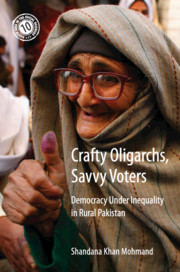Book contents
- Frontmatter
- Dedication
- Contents
- List of Tables and Figures
- Acknowledgements
- Glossary of Local Terms
- 1 Introduction: Rural Voters under Inequality in an Emerging Democracy
- 2 Colonial Constructs and Post-colonial Politics: 1849–2018
- 3 Landed Power in Sahiwal: From Domination to Intermediation
- 4 Local Competition and Bargaining Power: Conceptualising Political Engagement in Rural Punjab
- 5 Bargaining with Landlords: Comparing Political Engagement in Unequal Contexts
- 6 Structural Inequality and Variations in Political Engagement
- 7 When Do Shifts in Political Engagement Occur?
- 8 Conclusion: The Future of Pakistan's Democracy
- Annex 1 Chronology of Political Events in Pakistan
- Annex 2 Index of Political Engagement (IPE) Scores for 38 Villages
- Annex 3 Research Instruments
- Annex 4 Detailed Descriptions of Household Variables Used in Multivariate Regression Analysis
- Bibliography
- Index
1 - Introduction: Rural Voters under Inequality in an Emerging Democracy
Published online by Cambridge University Press: 26 April 2019
- Frontmatter
- Dedication
- Contents
- List of Tables and Figures
- Acknowledgements
- Glossary of Local Terms
- 1 Introduction: Rural Voters under Inequality in an Emerging Democracy
- 2 Colonial Constructs and Post-colonial Politics: 1849–2018
- 3 Landed Power in Sahiwal: From Domination to Intermediation
- 4 Local Competition and Bargaining Power: Conceptualising Political Engagement in Rural Punjab
- 5 Bargaining with Landlords: Comparing Political Engagement in Unequal Contexts
- 6 Structural Inequality and Variations in Political Engagement
- 7 When Do Shifts in Political Engagement Occur?
- 8 Conclusion: The Future of Pakistan's Democracy
- Annex 1 Chronology of Political Events in Pakistan
- Annex 2 Index of Political Engagement (IPE) Scores for 38 Villages
- Annex 3 Research Instruments
- Annex 4 Detailed Descriptions of Household Variables Used in Multivariate Regression Analysis
- Bibliography
- Index
Summary
It was a hot summer evening and as I walked out of the landlord's living room in his spacious bungalow, I noticed that a crowd had begun to gather early in an open space just outside the inner walls of the house. People were arriving from different parts of the village for a meeting that the landlord, Naib, had called. They walked up in groups and seated themselves on what appeared to be pre-designated charpais (string beds) laid out neatly in a square formation. As I looked down the four sides of the square, I realised that everyone present was male and from amongst the older members of the village, and that they seemed to have sorted themselves into quoms and biradaris – groups that I recognised because of the few weeks we had now spent doing field research in this village. The zamindar quom, or landowning caste, and its various biradaris were all seated together on one side, members of the kammi quom, or artisanal caste, were seated together on another side, and some kammi biradaris and a few muslim sheikhs, the lowest caste, filled the third side. The fourth side, at the head of the square, was still empty, to be filled shortly by Naib, his cousins and nephews, his estate managers, or munshis, and his special guests – the men in our research team. I, as the only female in the group, was asked to remain inside the walled garden of the bungalow.
People walked around and warmly greeted one another but most stuck to their own side of the square in general. Once everyone had settled down, one of the managers walked into the living room to inform Naib that it was now time for him to join them. The landlord and his male relatives emerged together with great ceremony and walked towards the gathering of village residents, all of whom stood up to greet them. While his family and managers walked straight to their assigned charpais at the head of the square, Naib walked down each side of it, greeting each person as he went. With the zamindars he exchanged the customary hug, followed by a quick handshake.
- Type
- Chapter
- Information
- Crafty Oligarchs, Savvy VotersDemocracy under Inequality in Rural Pakistan, pp. 1 - 48Publisher: Cambridge University PressPrint publication year: 2019



